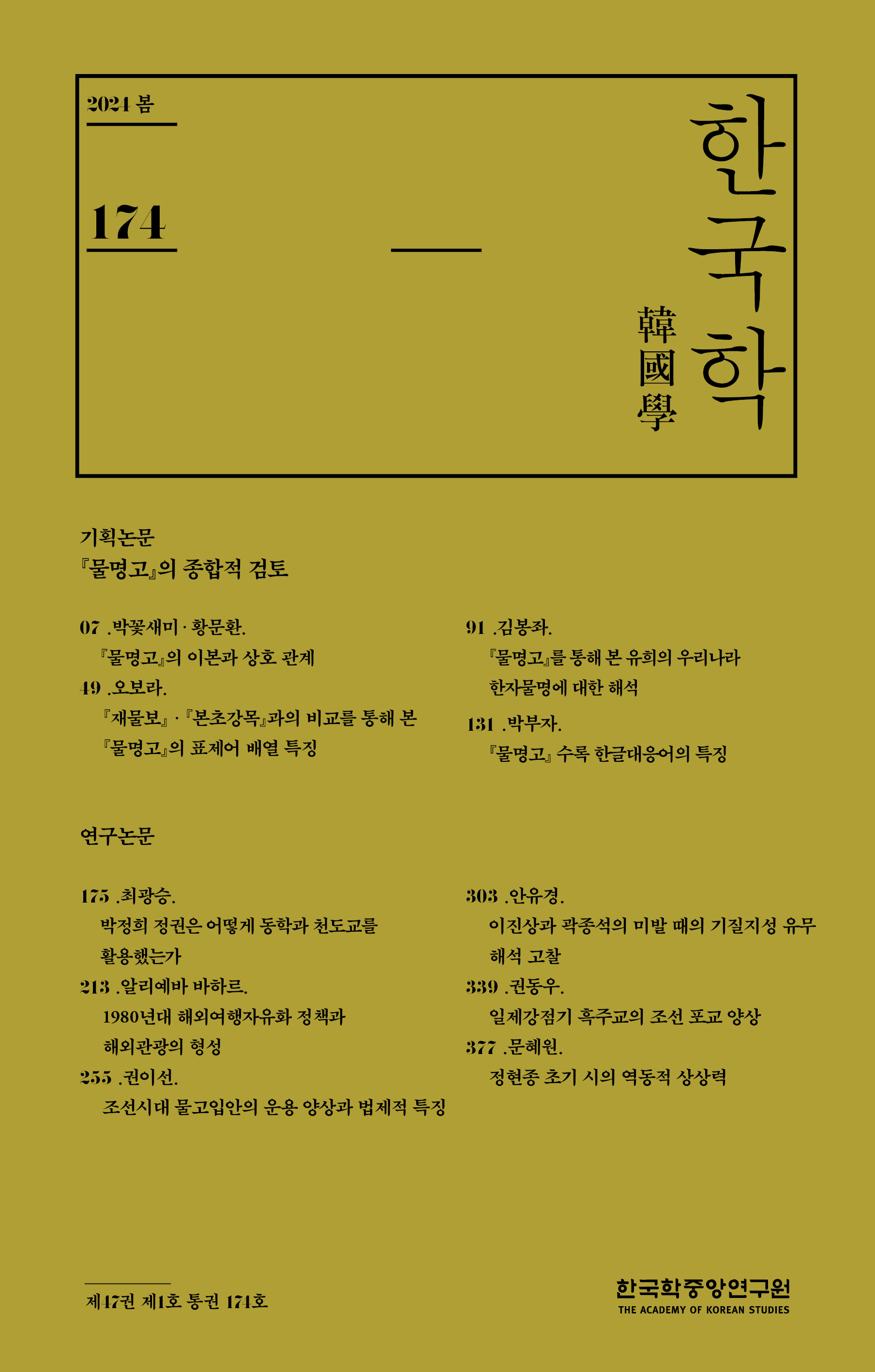
- P-ISSN 2671-8197
- E-ISSN 2733-936X
러시아와 중국의 기밀해제문서에 대한 분석을 통해 이 논문은 북한‐중국‐소련 관계가 6ㆍ25전쟁의 과정에 미친 영향과 전후 북한체제의 대외적인 행태에 미친 영향을 논하였다. 전쟁 개시 결정에 관해 북한이 소련과 중국에 보인 자발적인 종속의 감정은 1950년 10월 분노로 변했다. 스탈린이 김일성에게 한반도에서 철수하라고 명령했기 때문이었다. 중공군의 개입은 북한의 패배를 막아줬지만 북한과 전쟁 결과에 대한 김일성의 모욕감과 무기력을 가져왔다. 이러한 경험은 외부의 경제적 군사적 지원은 계속 필요하지만 한반도의 운명은 결국 자신들에게 달려 있다는 생각을 굳히게 되는 계기가 됐다.
Based on Russian and Chinese archival records, this paper examines the influence of the Sino-Soviet-North Korean triangular relations on the course of the Korean War and on the North Korean diplomatic behavior after the end of the war. It argues that Pyongyang’s willing subjugation to Soviet and Chinese interests in the decision for war turned to bitter resentment in October 1950, when Stalin ordered Kim Il Sung to evacuate his troops from DPRK territory. The eventual entry of Chinese troops, while preventing defeat, brought Kim Il Sung personal humiliation and loss of control over his country and over the outcome of the war. The wartime alliance thus brought about assumption that Korea’s salvation could only be entrusted to Koreans, even while fraternal allies would be used as sources of economic and military aid.
개디스, 존 루이스 저, 강규형ㆍ정철 옮김, 냉전의 역사: 거래, 스파이, 거짓말,그리고 진실 . 서울: 에코리브르, 2010.
김영호, 한국전쟁의 기원과 전개과정 . 서울: 성신여자대학교 출판부, 2006.
이명희ㆍ강규형, 「한국 근ㆍ현대사 교과서의 문제점과 개선 방향」. 사회과교육 48권 1호, 2009, 93-109쪽.
Bajanov, Evgenii P. and Natalia Bajanova, “The Korean Conflict, 1950-1953: The Most Mysterious War of the 20th Century,” unpublished manuscript based on records from the Presidential Archive of Russia.
Fendler, Karoly, “Economic Assistance and Loans from Socialist Countries to North Korea in the Postwar Years, 1953-1963,” Asien. no. 42, 1992, pp. 39-51.
Frank, Rudiger, Die DDR und Nordkorea: der Wiederaufbau der Stadt Hamburg von 1954-1962. Aachen: Shaker, 1996.
Gaddis, John Lewis, The Long Peace: Inquiries into the History of the Cold War. New York: Oxford University Press, 1987.
Gaddis, John Lewis, We Now Know: Rethinking Cold War History. New York: Oxford University Press, 1997.
Goncharov, Sergei N., John W. Lewis, and Xue Litai, Uncertain Partners: Stalin, Mao, and the Korean War. Stanford: Stanford University Press, 1993.
Khrushchev, Nikita, Khrushchev Remembers: The Glasnost Tapes. Boston: Little, Brown and Co., 1990.
Kim, Gye-Dong, “Who Invented the Korean War?” James Cotton and Ian Neary (eds.), The Korean War in History. Manchester, U. K.: University of Manchester Press, 1989, pp. 33-50.
Koh, B. C., “The War’s Impact on the Korean Peninsula,” The Journal of American-East Asian Relations, vol. 2, no. 1, 1993, pp. 57-76.
Lankov, Andrei, From Stalin to Kim Il Sung: The Formation of North Korea, 1945-1950. New Brunswick, New Jersey: Rutgers University Press, 2002.
MacDonald, Callum A., Korea: The War Before Vietnam. London: Macmillan, 1986.
Mansourov, Alexandre Y., “Stalin, Mao, Kim, and China’s Decision to Enter the Korean War, Sept. 16-Oct. 15, 1950: New Evidence from the Russian Archives,” Cold War International History Project Bulletin, Issue 6/7, 1995/96, pp. 94-107.
Montefiore, Simon Sebag, Stalin: The Court of the Red Star. New York: Knopf, 2004.
Schaefer, Bernd, “Weathering the Sino-Soviet Conflict: The GDR and North Korea, 1949-1989,” Cold War International History Project Bulletin, Issue 14/15, 2003/2004, pp. 9-24.
Shen, Zhihua, “Sino-North Korean Conflict and its Resolution during the Korean War,” Cold War International History Project Bulletin, Issue 14/15, 2003/2004,pp. 9-24.
Van Ree, Erik, “The Limits of Juche: North Korea’s Dependence on Soviet Industrial Aid, 1953-76,” The Journal of Communist Studies vol. 5, no. 1. 1989, pp. 50-73.
Weathersby, Kathryn, “The Soviet Role in the Korean War: The State of Historical Knowledge,” William Stueck(ed.), The Korean War in World History. Lexington: The University Press of Kentucky,2004, pp. 61-92.
Weathersby, Kathryn, “Should We Fear This? Stalin and the Danger of War with America,” Working Paper no. 39, Cold War International History Project, Woodrow Wilson International Center for Scholars, Washington, D.C., July 2002, pp. 1-27.
Weathersby, Kathryn, “Stalin, Mao, and the End of the Korean War,” Odd Arne Westad(ed.), Brothers in Arms: The Rise and Fall of the Sino-Soviet Alliance. Washington and Stanford: Woodrow Wilson Center Press/Stanford University Press, 1998, pp. 90-116.
Weathersby, Kathryn, “Deceiving the Deceivers: Moscow, Beijing, Pyongyang and the Allegations of Bacteriological Weapons Use in Korea,” Cold War International History Project Bulletin, Issue 11, 1998, pp. 176-184.
Weathersby, Kathryn, “To Attack or Not to Attack?: Stalin, Kim Il Sung, and the Prelude to War,” Cold War International History Project Bulletin, Issue 5, Spring 1995, pp. 1-9.
Weathersby, Kathryn, “Making Foreign Policy under Stalin: The Case of Korea,” Niels Erik Rosenfeldt, Bent Jensen, and Erik Kulavig(eds.), Mechanisms of Power in the Soviet Union. London and New York: Macmillan Press/St. Martin’s Press, 1993, pp. 224-240.
Westad, Odd Arne(ed.), Brothers in Arms: The Rise and Fall of the Sino-Soviet Alliance. Washington and Stanford: Woodrow Wilson Center Press and Stanford niversity Press, 1998.